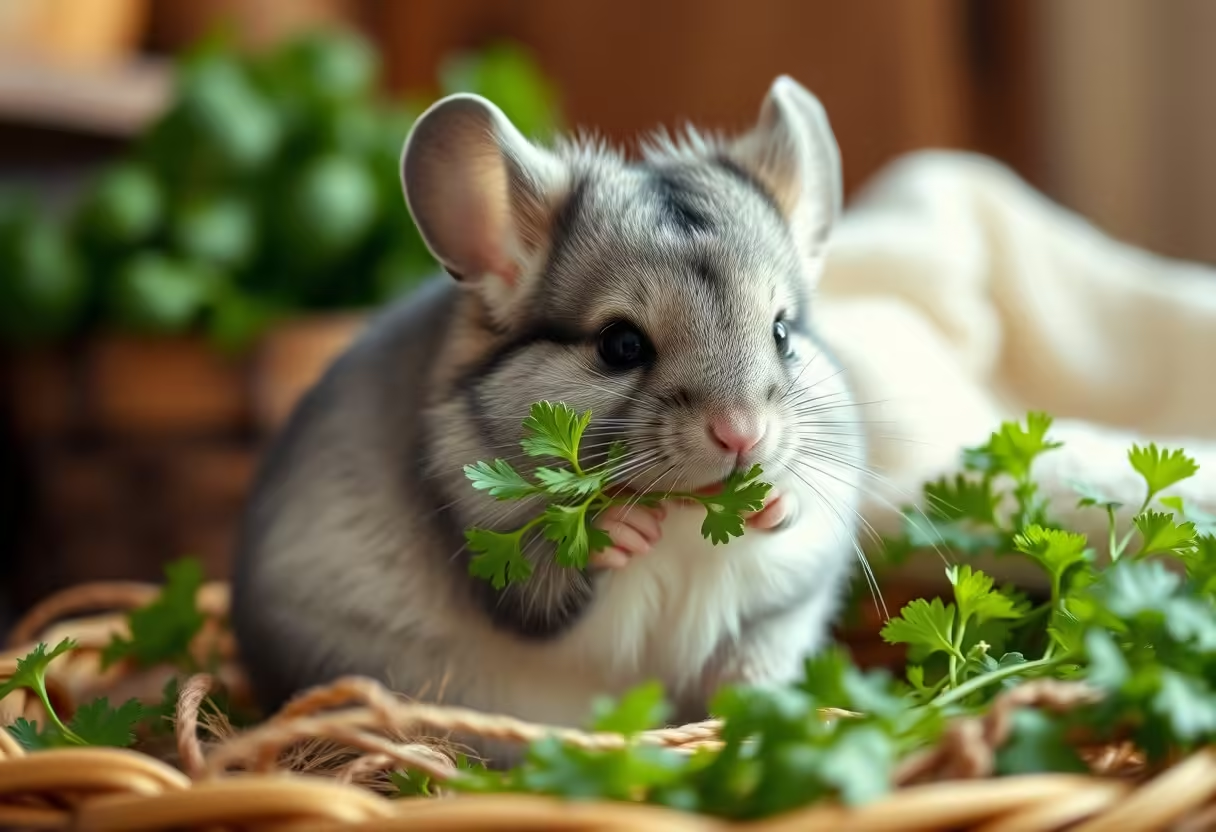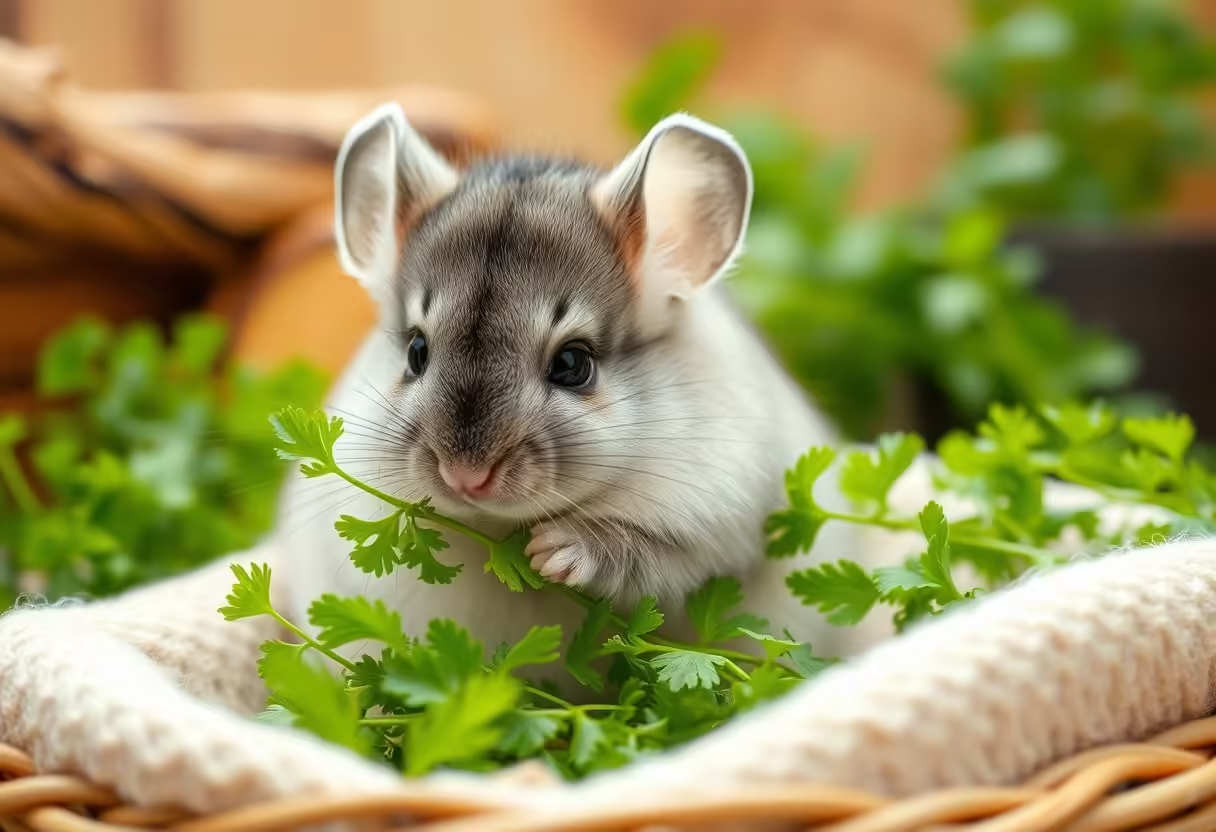As you examine into the world of chinchilla care, you may find yourself pondering the perfect snacks for your furry friend. With parsley being a popular herb in many human recipes, it’s natural to wonder: can chinchillas eat parsley? It’s imperative to get it right, as incorrect food choices can lead to digestive issues and even health problems. In this article, we’ll explore the answer to this question, providing you with the knowledge you need to make informed decisions about your chinchilla’s diet and ensure they thrive under your care.
Key Takeaways:
- Parsley in moderation: Chinchillas can eat parsley, but it should be given in limited amounts as an occasional treat. Overconsumption can lead to digestive issues.
- Fresh parsley is best: Fresh parsley is recommended over dried parsley, as it provides more nutritional benefits and is less likely to cause stomach upset.
- Balance with hay and pellets: Parsley should not replace a chinchilla’s main diet of high-quality hay and pellets. Ensure parsley is given in addition to, not instead of, their regular food.
Nutritional Value of Parsley
Your chinchilla’s diet should consist of nutrient-rich foods, and parsley is no exception. This herb is packed with vitamins, minerals, and antioxidants that can provide several health benefits.
Vitamins and Minerals
To understand the nutritional value of parsley, let’s take a closer look at its vitamin and mineral content. Parsley is an excellent source of vitamin K, which plays a crucial role in blood clotting and bone health. It’s also rich in vitamin C, a powerful antioxidant that boosts the immune system. Additionally, parsley contains potassium, an important mineral that helps regulate blood pressure.
Antioxidant Properties
Properties like flavonoids and carotenoids make parsley an antioxidant powerhouse. These compounds help protect your chinchilla’s cells from damage caused by free radicals, which can contribute to chronic diseases.
Vitamins and antioxidants in parsley work together to provide a range of benefits. For instance, the antioxidant properties of parsley can help reduce inflammation, which is particularly important for chinchillas prone to respiratory issues. Furthermore, the high vitamin C content in parsley can help support your chinchilla’s immune system, reducing the risk of illness. However, it’s important to remember that parsley should be given in moderation, as excessive consumption can cause stomach upset in your furry friend.
Chinchillas’ Dietary Needs
Some of the most important aspects of caring for your chinchilla involve understanding their dietary requirements. A well-balanced diet is crucial for maintaining their overall health and preventing potential health issues.
Hay-based Diet
To ensure your chinchilla stays healthy, a high-quality hay should make up the bulk of their diet, accounting for around 80% of their daily food intake. Hay helps keep their teeth trimmed and provides important fiber for digestion.
Limited Fresh Vegetables
Dietary experts recommend limiting fresh vegetables to no more than 10% of your chinchilla’s daily diet. This is because many vegetables are high in water content and can cause digestive issues if fed in excess.
Vegetables, such as parsley, should be introduced gradually and in small amounts to prevent stomach upset. It’s important to research which vegetables are safe for your chinchilla to eat, as some can be toxic. On the other hand, some vegetables, like leafy greens, can provide valuable nutrients. By limiting the amount of fresh vegetables, you can ensure your chinchilla receives the necessary nutrients without compromising their digestive health.

Can Chinchillas Eat Parsley?
Now, when it comes to feeding parsley to your chinchilla, the answer is yes, but with caution. Parsley is not toxic to chinchillas, and in moderation, it can be a healthy addition to their diet. However, it’s necessary to remember that parsley is high in calcium, which can lead to health issues if fed excessively.
Moderation is Key
For optimal health, limit the amount of parsley you feed your chinchilla to no more than 1-2 tablespoons per pound of body weight per day. This will ensure your pet gets the benefits of parsley without risking an overload of calcium.
Watch for Signs of Digestive Issues
Signs of digestive upset, such as diarrhea, lethargy, or loss of appetite, can occur if your chinchilla eats too much parsley. Keep a close eye on your pet’s behavior and stool quality after introducing parsley into their diet.
A sudden change in your chinchilla’s droppings, such as watery or soft stools, can be a warning sign that they’re experiencing digestive issues. If you notice any of these symptoms, stop feeding parsley immediately and consult with a veterinarian. On the other hand, if your chinchilla is eating parsley in moderation and showing no signs of distress, it can be a healthy and nutritious treat.
Final Words
Hence, as you now know, chinchillas can indeed eat parsley in moderation. You’ve learned that this herb, rich in vitamins and antioxidants, can provide a delightful treat for your furry friend. Remember to introduce it gradually and in limited amounts to prevent digestive upset. By doing so, you’ll be rewarding your chinchilla with a healthy and tasty snack. As you continue to care for your pet, recall the importance of a balanced diet and consult with a veterinarian if you have any concerns.
FAQ
Q: Can chinchillas eat parsley as a regular part of their diet?
Chinchillas should not have parsley regularly because of its high calcium, which can lead to digestive problems. Use it as an occasional treat or fresh herb for variety.
Q: How much parsley is safe for my chinchilla to eat?
A: Offer parsley to your chinchilla in moderation, about 1-2 sprigs per pound of body weight as an occasional treat. Monitor behavior and stool quality for any signs of digestive upset.
Q: Are there any other herbs that are safer for my chinchilla to eat?
A: Some safe herbs for chinchillas are timothy hay, alfalfa hay, oat hay, dandelion greens, kale, and collard greens. Introduce new herbs slowly and consult a vet for any concerns.
